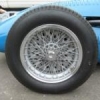I know I shouldn’t (comment from BBC Eff One article)
#1

Posted 20 March 2023 - 11:43
“It (F1) became a farce long ago.
When the rules changed back to allowing prototype engines, some of the best racing F1 has had was when engines had to be based on standard mass production engine blocks, and we got nice cheap, driveable cars like the Renault turbos and cosworth mclaren,look at the briliant classic competitions between drivers and the fact that folk still did F1 for fun..
Prost v senna !”
Now the initial 4 cylinder Cosworth was based on the 120 E Lotus Cortina engine, but the DFV wasn’t a mass production block (other than being mass produced for competition!). And the Renault EF series came from the CH which was definitely a dedicated competition engine.
All that work JP Jabouille did with the Renault to make it so cheap and easy to drive….
Am I remembering my history wrong or is it mildly depressing that the quote above has 62 “likes” and only 6 who are quizzical?
Advertisement
#2

Posted 20 March 2023 - 12:12
Not to mention compound changing of the rules...
I didn't even think it was possible to understand what the engine rules are today anyway!
#3

Posted 20 March 2023 - 13:24
Maybe they were thinking of Formula Junior.
#4

Posted 20 March 2023 - 14:00
But wasn't the BMW M12/13 based on a production block? And if so was that the last time it was so?
#5

Posted 20 March 2023 - 14:08
But wasn't the BMW M12/13 based on a production block? And if so was that the last time it was so?
Yes, I understand that it was, but it wasn’t mandatory that it should be. And yes, it might well have been the most recent, can’t think of any others off the top of my head.
#6

Posted 20 March 2023 - 14:15
But wasn't the BMW M12/13 based on a production block? And if so was that the last time it was so?
Are there any in private hands available for inspection?
#7

Posted 20 March 2023 - 15:53
Survey SEZ... AJCee, answer B is correct: It is mildly depressing that the quote above has 62 “likes” and only 6 who are quizzical.
#8

Posted 20 March 2023 - 17:54
Well , the Repco V8 (inter alia ) certainly had blue collar credentials but that was pragmatism and opportunism . I have been in blissful ignorance of which stock block spawned the BRM V16 or H16 , the Honda and Renault V10s, not to mention the Life W12 , even if the latter's pace suggested .it was originally fitted to a Renault 4
#9

Posted 21 March 2023 - 00:10
But wasn't the BMW M12/13 based on a production block? And if so was that the last time it was so?
And I'm pretty sure it was remarkable that this was the case. BMW made a bit of a thing about it being a stock block.
BRM
#10

Posted 21 March 2023 - 08:39
Really?
“It (F1) became a farce long ago.
When the rules changed back to allowing prototype engines, some of the best racing F1 has had was when engines had to be based on standard mass production engine blocks, and we got nice cheap, driveable cars like the Renault turbos and cosworth mclaren,look at the briliant classic competitions between drivers and the fact that folk still did F1 for fun..
Prost v senna !”
Now the initial 4 cylinder Cosworth was based on the 120 E Lotus Cortina engine, but the DFV wasn’t a mass production block (other than being mass produced for competition!). And the Renault EF series came from the CH which was definitely a dedicated competition engine.
All that work JP Jabouille did with the Renault to make it so cheap and easy to drive….
Am I remembering my history wrong or is it mildly depressing that the quote above has 62 “likes” and only 6 who are quizzical?
When did anyone last race in F1 "for fun"?
Edited by Glengavel, 21 March 2023 - 08:40.
#11

Posted 21 March 2023 - 12:34
The Vanwall 4 cyl engine was partially based upon a Norton motorcycle engine. The Coventry Climax 4 cyl was derived from a fire pump. But these, along with Repco, and BMW, are the exceptions.
An expanded fanbase is wonderful and hopefully ensures continued success of the sport. But is it too much to expect some appreciation for the history of the sport, at least to the extent of knowing basic facts ?
#12

Posted 21 March 2023 - 12:58
When did anyone last race in F1 "for fun"?
I nominate Ken Tyrrell. And perhaps Frank Williams, committing his personal version of "fun". Given the personal version of "fun" parameter, ($$$$$$) maybe even Bernie.
Edit: Just to be clear, one of the above is not like other people. I hesitated to include "other".
Edited by 10kDA, 21 March 2023 - 13:03.
#13

Posted 21 March 2023 - 14:27
Originally posted by rl1856
The Vanwall 4 cyl engine was partially based upon a Norton motorcycle engine.....
At the risk of sounding a bit more than just contradictory, this is really not so...
The Norton component in the Vanwall engine was in the cylinder head and valvegear design. The Norton, of course, had air cooled heads, but the Vanwall was naturally enough Water cooled:

Vanwall cylinder head. The motorcycle heritage can be seen, but only if you look at it with that knowledge in hand.
Probably more important, and closer to the subject, was the fact that the bottom end of the engine was based on a Rolls-Royce military engine.
.....The Coventry Climax 4 cyl was derived from a fire pump.....
A primary requirement for the fire pump engine was lightness, so the racing versions of the little pump engines were indeed derived from them. However, the Formula One (and F2, for that matter) engines from Coventry Climax were a different matter altogether.
As people were using their engines in racing cars (mostly Sports Racing cars), the decision was made to go all-out to build a Formula One engine - and so was born the dohc 'Godiva' V8. Which was shelved in the belief that it wasn't good enough.
Later 4-cylinder engines partially based on one half of this engine were built for F2, these grew over a few years to become F1 engines. These racing engines were not related to the 1100cc single-cam engines in anything other than the most distant ways.
#14

Posted 22 March 2023 - 11:05
And I'm pretty sure it was remarkable that this was the case. BMW made a bit of a thing about it being a stock block.
There are two other useful threads here which discuss the M12, mostly about F2.
We can acknowledge that the early versions (up to M12/6) were stock block because F2 rules required that engines were derived from a homologated road car. F2 rules changed (1976?) to permit pure racing engines, with BMW introducing a new variant the M12/7.
The M10 road car engine had a chain driven cam shaft; all M12s used a gear train, which must have required some fancy adaptation of the front of the block. Consider all the other adaptations required for a dry sump engine, a different ignition system, different bores and cranks, bearing dimensions etc. Eventually it makes sense to make a fresh pattern set for block castings, distinct from the M10 design. The number of M12s in use by the late 1970s would have made it worthwhile. As BRG commented four years ago, how much modification renders an engine non-production?
The narrative about the M12/13 being derived from a stock block is a great marketing tale -- which contains some truth. But I'd like to see a bare F1 block next to a production car block. The stories about weathering production blocks are utter flimflam, equalling Colin Chapman's explanations about how his cars worked.
#15

Posted 22 March 2023 - 11:13
The LDS-Alfa Romeo which competed in several South African GP was stock block.
#16

Posted 22 March 2023 - 14:57
And was Jo Siffert alone in running a Lotus 22 with a 1500 Ford pushrod engine in the Brussels F1 race in 1962?
You will find odd entries, I'm sure, during that period where people have 'upgraded' FJr cars to run in F1 races. In a similar vein, the F2 cars allowed in the 1966 German Grand Prix, of which there were ten, were all wearing Ford blocks.
#17

Posted 23 March 2023 - 00:11
These (Coventry Climax) racing engines were not related to the 1100cc single-cam engines in anything other than the most distant ways.
But Ray ... the "Coventry Climax" lettering cast into the cam covers was exactly the same? So it must be .......!
#18

Posted 23 March 2023 - 00:31
At the risk of sounding a bit more than just contradictory, this is really not so...
The Norton component in the Vanwall engine was in the cylinder head and valvegear design. The Norton, of course, had air cooled heads, but the Vanwall was naturally enough Water cooled:
Vanwall cylinder head. The motorcycle heritage can be seen, but only if you look at it with that knowledge in hand.
Probably more important, and closer to the subject, was the fact that the bottom end of the engine was based on a Rolls-Royce military engine.
It is interesting that although you are correct in the final product, the initial development was Norton based cylinder head and valve-gear, but also using separate Norton cylinder barrels screwed into a Vanwall designed crank-case.
It was during the design and development of the crank-case (which was taking too long in management's eyes) that the Rolls Royce B 40 crankcase/cylinder block unit was looked at, then chosen as the base the Vanwall F1 engine (or should I say Grand Prix engine - not wishing to start that argument .... again!). This was all at the instigation of Anthony Vanwall, one of Tony's son, who had worked at Rolls Royce.
Part of the success of the Vanwall engine was the fact it was designed from the outset to run on alcohol-based fuels, rather than being adapted to run on alcohol. This too was a direct result of Tony Vanwall being a director of Norton from 1946 and his engine team carrying out much development on a water cooled version of the Norton 500 engine running on alcohol.
Cheers
Steve W
Edited by Porsche718, 23 March 2023 - 00:32.
#19

Posted 05 August 2023 - 11:31
As far as I know the Aprilia Cube MotoGp bike from the early days of the 900 4 stroke era in 2002 was loosely based on a Cosworth f1 engine, it is why it ran no throttle cable and also ran with pneumatic valves, de-rigeur in f1 back then but not on bikes for weight reasons, but they quickly became standard on GP bikes for the revs they enabled. I do not really know the truth here but it was not a great engine for bike racing, as it was not very linear, it was very powerful and fast but the throttle was snappy and difficult to ride which i expect had something to do with its heritage!
Advertisement
#20

Posted 05 August 2023 - 14:16
When did anyone last race in F1 "for fun"?
Great idea for a thread.
#21

Posted 05 August 2023 - 14:28
Mention above of 'Anthony Vanwall'... ![]()
MoD - or War Ministry - Rolls-Royce B40 engine base - Hurrah for the Austin Champ.
DCN
#22

Posted 06 August 2023 - 04:50
Are there any in private hands available for inspection?
A Leyton House here in Adelaide and yes it is a production block. I suspect quite heavy.
#23

Posted 06 August 2023 - 05:01
There are two other useful threads here which discuss the M12, mostly about F2.
We can acknowledge that the early versions (up to M12/6) were stock block because F2 rules required that engines were derived from a homologated road car. F2 rules changed (1976?) to permit pure racing engines, with BMW introducing a new variant the M12/7.
The M10 road car engine had a chain driven cam shaft; all M12s used a gear train, which must have required some fancy adaptation of the front of the block. Consider all the other adaptations required for a dry sump engine, a different ignition system, different bores and cranks, bearing dimensions etc. Eventually it makes sense to make a fresh pattern set for block castings, distinct from the M10 design. The number of M12s in use by the late 1970s would have made it worthwhile. As BRG commented four years ago, how much modification renders an engine non-production?
The narrative about the M12/13 being derived from a stock block is a great marketing tale -- which contains some truth. But I'd like to see a bare F1 block next to a production car block. The stories about weathering production blocks are utter flimflam, equalling Colin Chapman's explanations about how his cars worked.
I have seen pics of those blocks out in the weather.
Perkins diesels too used to weather blocks.
In the distant past some Nascar engines were built up as stock engines and 'heat cured' in everyday driving. Then refinished as race engines. Otherwise 24 hours in an oven at moderate temps to stabilise the iron. I suspect modern iron blocks probably do not need that now.
#24

Posted 06 August 2023 - 08:53
Was the Porsche 718 block based (at least) on the 356?


















